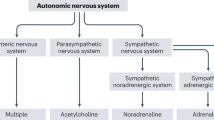Abstract
Purpose
To determine if autonomic symptoms are associated with previous Zika virus infection.
Methods
Case–control study including 35 patients with Zika virus infection without evidence of neurological disease and 105 controls. Symptoms of autonomic dysfunction were assessed with the composite autonomic symptom scale 31 (COMPASS-31).
Results
Patients with previous Zika virus infection had significantly higher COMPASS-31 score than controls regardless of age and sex (p = 0.007). The main drivers for the higher scores where orthostatic intolerance (p = 0.003), secretomotor (p = 0.04) and bladder symptoms (p < 0.001).
Conclusion
Zika virus infection is associated with autonomic dysfunction. The mechanisms remain to be elucidated.
Similar content being viewed by others
References
ICTV. International comittee on taxonomy of viruses. Virus taxonomy. 2014. Release 2015. [Internet]. [cited 2017 Mar 4]. Available from: https://talk.ictvonline.org/taxonomy/p/taxonomy-history?taxnode_id=20162479
Dick GWA, Kitchen SF, Haddow AJ (1952) Zika virus. I. Isolations and serological specificity. Trans R Soc Trop Med Hyg 46:509–520
Ioos S, Mallet H-P, Leparc Goffart I et al (2014) Current Zika virus epidemiology and recent epidemics. Med Mal Infect 44:302–307
Cao-Lormeau V-M, Blake A, Mons S, Lastère S, Roche C, Vanhomwegen J et al (2016) Guillain-Barré Syndrome outbreak associated with Zika virus infection in French Polynesia: a case–control study. Lancet 387:1531–1539
Zanluca C, Melo VC, Mosimann AL, Santos GI, Santos CN, Luz K (2015) First report of autochthonous transmission of Zika virus in Brazil. Mem Inst Oswaldo Cruz 110:569–572
Lessler J, Chaisson LH, Kucirka LM et al (2016) Assessing the global threat from Zika virus. Science 353:aaf8160
Anaya J-M, Rodríguez Y, Monsalve DM, Vega D, Ojeda E, Gonz Alez-Bravo D et al (2016) A comprehensive analysis and immunobiology of autoimmune neurological syndromes during the Zika virus outbreak in Cúcuta, Colombia. J Autoimmun 77:123–138
Freeman R, Miyawaki E (1993) The treatment of autonomic dysfunction. J Clin Neurophysiol 10:61–82
Wang H, Siddharthan V, Hall JO, Morrey JD (2011) Autonomic nervous dysfunction in hamsters infected with west nile virus. PLoS One 6:e19575
Carod-Artal FJ (2018) Infectious diseases causing autonomic dysfunction. Clin Auton Res 28(1):67–81
Morrey JD, Siddharthan V, Wang H (2013) Neurological approaches for investigating West Nile virus disease and its treatment in rodents. Antiviral Res 100:535–545
Leis AA, Stokic DS (2012) Neuromuscular manifestations of West Nile virus infection. Front Neurol 3:1–10
Weiss D, Carr D, Kellachan J, Tan C, Phillips M, Bresnitz E et al (2001) Clinical findings of West Nile virus infection in hospitalized patients, New York and New Jersey, 2000. Emerg Infect Dis 7:654–658
Sletten DM, Suarez GA, Low PA, Mandrekar J, Singer W (2012) COMPASS 31: a refined and abbreviated composite autonomic symptom score. Mayo Clin Proc 87:1196–1201
Pierangeli G, Turrini A, Giannini G, Del Sorbo F, Calandra-Buonaura G, Guaraldi P et al (2015) Translation and linguistic validation of the composite autonomic symptom score COMPASS 31. Neurol Sci 36:1897–1902
González P, García X, Guerra A, Arango JC, Delgado H, Uribe CS et al (2014) Experience with Guillain–Barré syndrome in a neurological intensive care unit. Neurologia 31:389–394
Wang H, Siddharthan V, Hall JO, Morrey JD (2014) Autonomic deficit not the cause of death in West Nile virus neurological disease. Clin Auton Res 24:15–23
Mohammed J, Derom E, De Wandele I et al (2017) Autonomic symptoms in patients with moderate and severe chronic obstructive pulmonary disease. Acta Clin Belg. https://doi.org/10.1080/17843286.2017.1379255
Versace V, Gutmann B, Sebastianelli L, Martignago S, Saltuari L, Nardone R, Wiedermann CJ (2017) Tick-borne viral encephalomyeloradiculitis complicated by severe autonomic myenteric involvement resulting in irreversible adynamic ileus. Clin Auton Res 27(3):205–207
Acknowledgements
The authors would like to thank the people who participated in this study and Hermelinda Rueda, Julián Barahona-Correa, Nicolás Molano-González, Cecile Dunn and all the members of the Center for Autoimmune Diseases Research (CREA) for their contributions. A special thanks is also extended to Dr. Eduardo E. Benarroch, from the Mayo Clinic Rochester, for his fruitful discussions, which helped us to improve the manuscript. Finally, we thank the reviewers of this manuscript for their careful reading and their many insightful comments and suggestions.
Funding
This study was supported by Universidad del Rosario (ABN011), and Colciencias (747-2016), Bogotá, Colombia.
Author information
Authors and Affiliations
Contributions
JMA and YR conceived and planned the study. YR travelled to Cucuta, contacted the patients and applied the COMPASS-31. YAA, DMM and CRS performed the neutralizing antibody and plaque reduction neutralization tests. YR and MR led the linguistic validation of COMPASS-31. YR, MR, CRS, YAA, DMM and JMA contributed to the interpretation of the results. YR, MR, and JMA drafted the manuscript. All authors provided critical feedback and helped shape the research, analysis and manuscript.
Corresponding author
Ethics declarations
Conflict of interest
The authors declare no conflict of interest.
Electronic supplementary material
Below is the link to the electronic supplementary material.
Rights and permissions
About this article
Cite this article
Rodríguez, Y., Rojas, M., Ramírez-Santana, C. et al. Autonomic symptoms following Zika virus infection. Clin Auton Res 28, 211–214 (2018). https://doi.org/10.1007/s10286-018-0515-1
Received:
Accepted:
Published:
Issue Date:
DOI: https://doi.org/10.1007/s10286-018-0515-1




